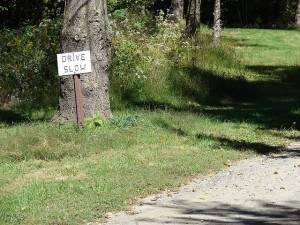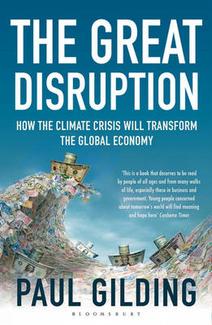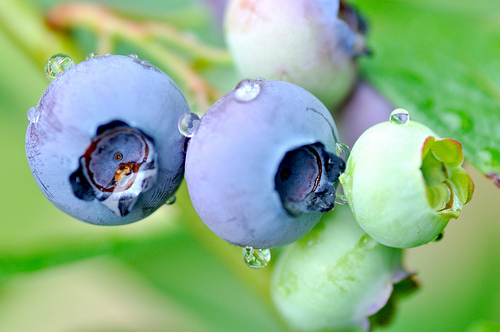‘I’ve realised wanting to do too much is almost as toxic as wanting too much stuff.’
(Tricia Hogbin @ Little Eco Footprints)
I’ve been thinking a lot about the idea of ‘slow’ lately, as embodied by the slow movement, and I’ve been wondering: is our fast paced lifestyle inherently unsustainable? I don’t mean unsustainable only on a personal level, though there is that, but is it also an inseparable part of our global problem with pushing up against the earth’s limits? Is it, in fact, an inevitable result of our global obsession with continual economic growth, which Paul Gilding convincingly argues it is impossible to sustain on a finite planet?
What is the Slow Movement?

Geoff Hudson, Chairman of Slow Food Australia, describes the basic principles of slow food as being about ‘good, clean and fair’ (FutureTense, Sept 2010). Slow Food began in Italy in 1986, when Carlo Petrini organised a demonstration against the planned McDonalds that was to be built near the Piazza di Spagna in Rome. The franchise was never built, and the Slow Food Movement began, with a focus on eating local cuisine and rejecting everything that ‘fast food’ implies: ‘fast life, non-sustainable food production and the eroding of local economies’ (‘Slow Food’ @ www.slowmovement.com).
From there the movement has grown to encompass every part of modern life, from slow food to whole slow cities. Carl Honore, author of In Praise of Slow: How a Worldwide Movement Is Challenging the Cult of Speed, has described our modern life as being ‘constantly marinaded in distraction and stimulation and activity’ (Future tense, 2010), but, he says, once you can get your head around the idea of ‘slow’ you can apply it to just about everything you do.
There is even a slow books movement now, which focuses on reading with more depth.* Living with more depth is perhaps the main emphasis of the slow philosophy, and though Hudson’s ‘good, clean and fair’ can be seen as encompassing a wider focus than that, some would argue that living deeper necessarily includes being fairer.
The Relationship Between Slow and Sustainable
 There are obvious similarities between slow living and sustainable living, for instance in slow food’s emphasis on sustainable agriculture, and eating local or home grown food. And the slow food movement does have a specific emphasis on sustainable development. But are they co-incidentally aligned – living slow and living sustainably – or is there an intrinsic connection?
There are obvious similarities between slow living and sustainable living, for instance in slow food’s emphasis on sustainable agriculture, and eating local or home grown food. And the slow food movement does have a specific emphasis on sustainable development. But are they co-incidentally aligned – living slow and living sustainably – or is there an intrinsic connection?
At the very least, we can probably say that living more slowly could slow our impact with the ‘limits to growth‘. In The Great Disruption, Paul Gilding describes our current situation as globally using around 150% of the world’s sustainable resources. In 2009, he tells us, we needed 140% of available land, or 1.4 planets, to sustain our global economy. In other words, we produced what we did that year by using 100% of what we could use in a sustainable way (that is, a way that we could keep doing over and over again), and then dipped into our ‘capital’ – in a big way. And there was nothing special about 2009 – forecasted growth means we’ll be using up more and more of our capital every year.
So those limits to growth that the 1972 report talked about are upon us now, and it’s easy to see how adopting a ‘slow’ lifestyle on a global scale might slow the impact. For instance, in a typical fast-paced family lifestyle, kids have multiple after school activities. ‘Slow Parenting’ challenges the need for these, and encourages us to let our children just play. Doing so will often mean saving petrol, as we won’t be running to multiple activities each day. This not only means less trips generally, but might also mean more use of walking, bikes or public transport, as these slower alternatives more possible with only one destination.
Another example: More activities – for kids and adults – means less time to cook, let alone grow your own food. So slowing down, or doing less, could mean a lower dependence on pre-packaged and convenience foods, which means less packaging and, potentially, less travel-miles on our food.
So living more slowly will have direct impacts on our carbon footprint at the very least. But, what I’m wondering is does our fast paced modern life contribute to our lack of sustainability in a more basic, quite inevitable way? Or perhaps another way to ask the question is: Is our fast paced lifestyle being driven by, but also only made possible by, our drive for continual economic growth?
I’m thinking about how accepting we are of ‘single use’ items now – single use being a nicer way of saying ‘throw away’ or disposable. From single use nappies (diapers) to single use coffee cups, single use serviettes (napkins), throw-away plastic food containers or toddler cups, and even single-use sanitary products for women. Almost none of these were standard only a couple of generations ago. Most weren’t standard when I was a child in the 70s. But a focus on doing more, more quickly, rather than on doing things better and getting the most out of them, fits in nicely with a culture that very deliberately set about making products that would break more quickly, in order to stimulate economic growth (if you’re not up with just how deliberate and open this was, and is, see The Story of Stuff).
But economic growth can be supported by more than just buying more stuff. It can be supported by doing more stuff too. And arguably, we are doing more stuff than ever before, all at the same time. But at what cost?
When We Hit Our Limits
In describing the future, Paul Gilding makes no bones about the fact that some of it will be hard, and that climate change, and pushing up against our other limits, will cause real and mass hardship. But, he is optimistic overall. Pointing out that the fathers of economics all typically foresaw the end of growth (he quotes from John Maynard Keynes, John Stuart Mill and Adam Smith), he then outlines a conversation he had with the executive director of the New Economics Foundation, Stewart Wallis. Wallis argued that our challenge now is to design a steady-state economy, and pointed out the significant differences between moving to this new, designed system and simply becoming a failed growth economy.
Gilding then describes in part what that steady state economy could look like. And to keep it simple it would look pretty Slow. More people working, but each spending less time at it. So more time to spend connecting with community, doing volunteer work, being there for our children. This is a transition that Gilding believes will only happen after we deal with climate change. Or at least, after we put in place the changes that will be needed to deal with it. That will be our first challenge, and Gilding predicts it will come to a head in this decade, when radical change will suddenly be seen as essential. But it will only be sometime later that we will recognise – on a large scale – that climate change was only a symptom of the greater problem, namely that we a still trying to run a growth economy on a planet that has reached its limits.
So does the fast paced lifestyle we have adopted at the least in much of the Western world, and certainly in Australian and American mainstream cultures, essentially cause unsustainable practices? Is it intrinsically linked with the idea of a (continual) growth economy? What do you think?
____________
*It’s really a digression but the idea of slow reading might be an essential antidote to the issue Nicholas Carr discussed in his article Is Google Making Us Stupid and expanded on in The Shallows: How the Internet is Changing the Way we Think, Read and Remember, in which he suggests that the web (not Google specifically) is causing a re-wiring of our brains, such that we find both sustained concentration and in depth contemplation, more difficult. (back)




I do believe our fast paced lifestyle is an unsustainable way to live. When my children were younger (they are adults now) we watched what we ate, what came into the home which leads to larger amounts of trash, and we didn’t drive every day. On those occasions when pressures did cause us to have a heavy schedule (we were responsible for aging grandparents) making a proper meal was either put aside or very late.
Even today home is where most activity happens. My son and his children are here often living within walking distance) and rather than use resources we craft with materials that would otherwise be thrown out or added to recycling we garden growing much of our own food and have the time to shop at farmers’ markets (again within walking distance). I gave up my car which reduced my burden on the environment as well.